小升初英语总复习第三章句型第二节疑问句 课件 35张PPT
文档属性
| 名称 | 小升初英语总复习第三章句型第二节疑问句 课件 35张PPT |

|
|
| 格式 | zip | ||
| 文件大小 | 102.5KB | ||
| 资源类型 | 教案 | ||
| 版本资源 | 通用版 | ||
| 科目 | 英语 | ||
| 更新时间 | 2019-02-24 00:00:00 | ||
图片预览

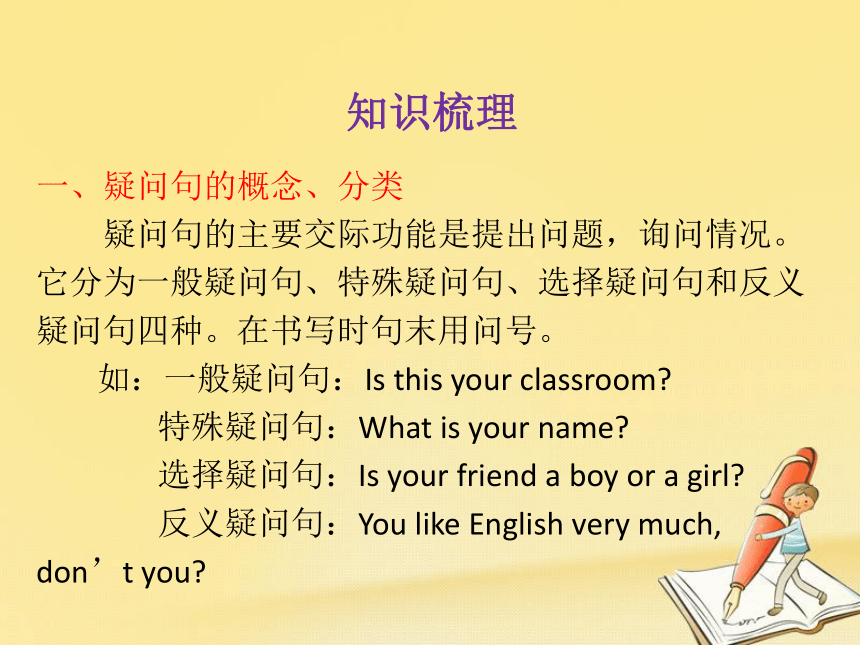
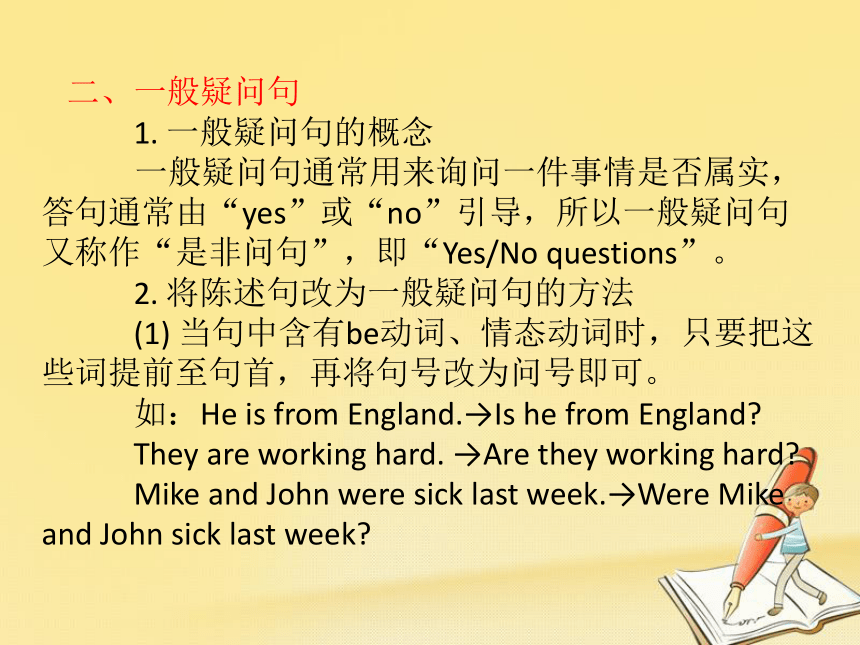

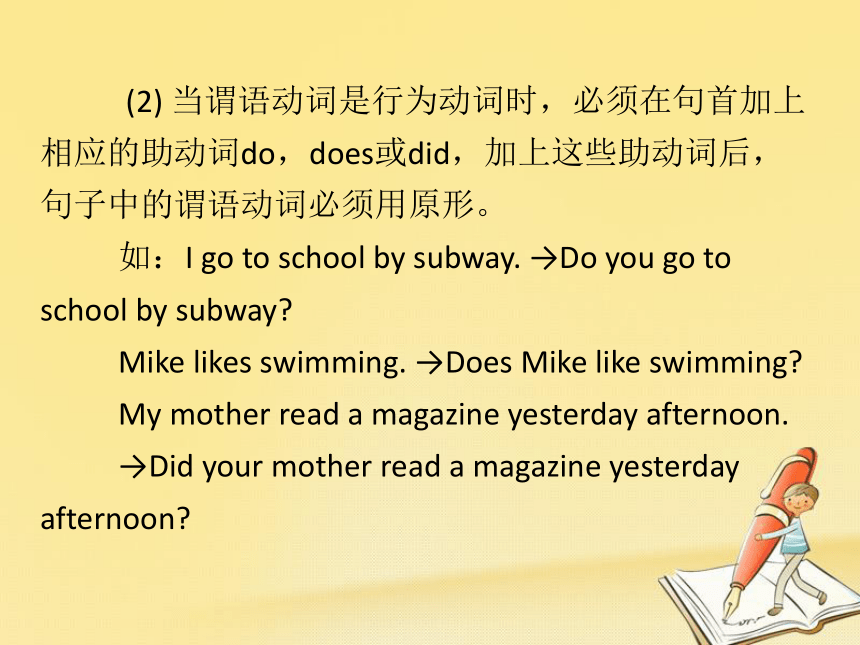
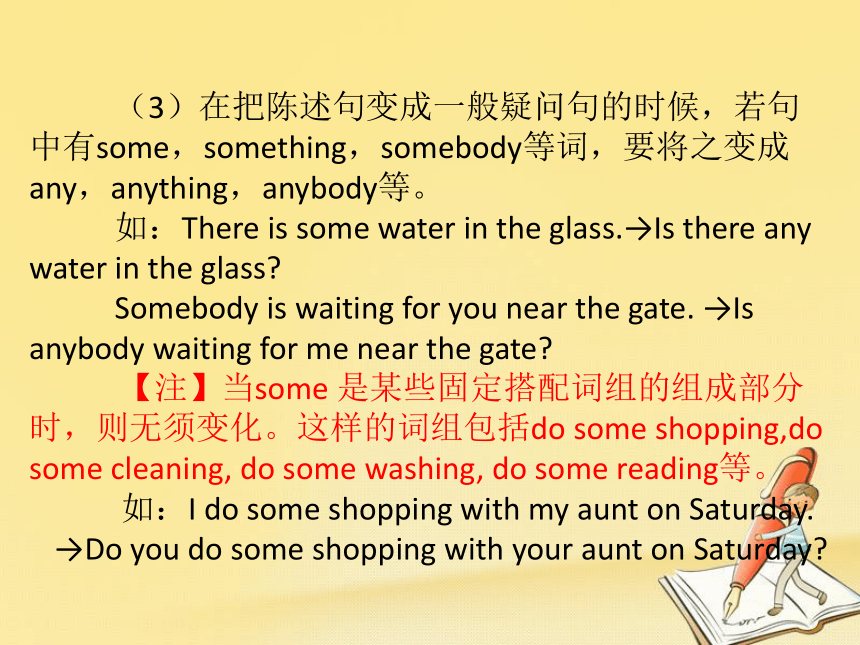
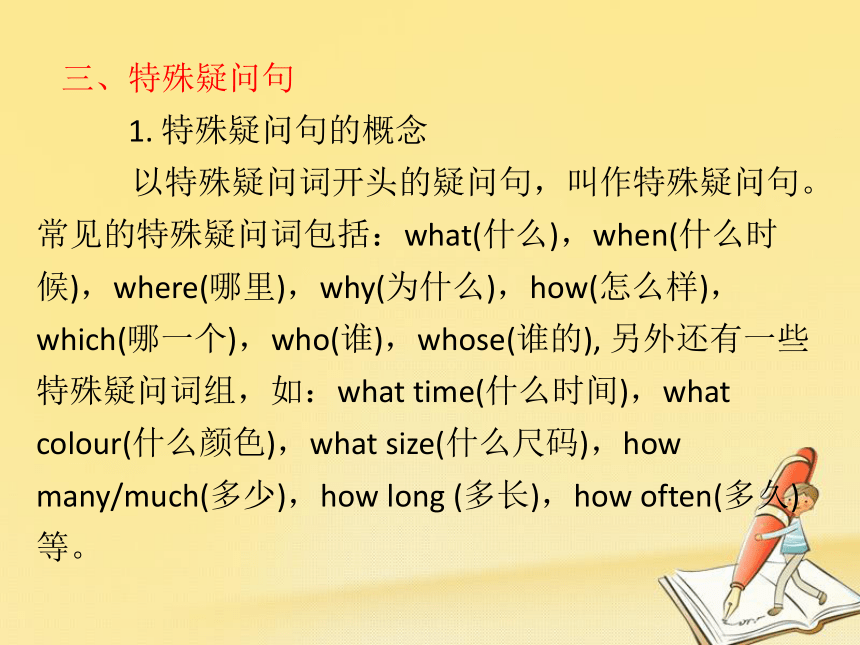
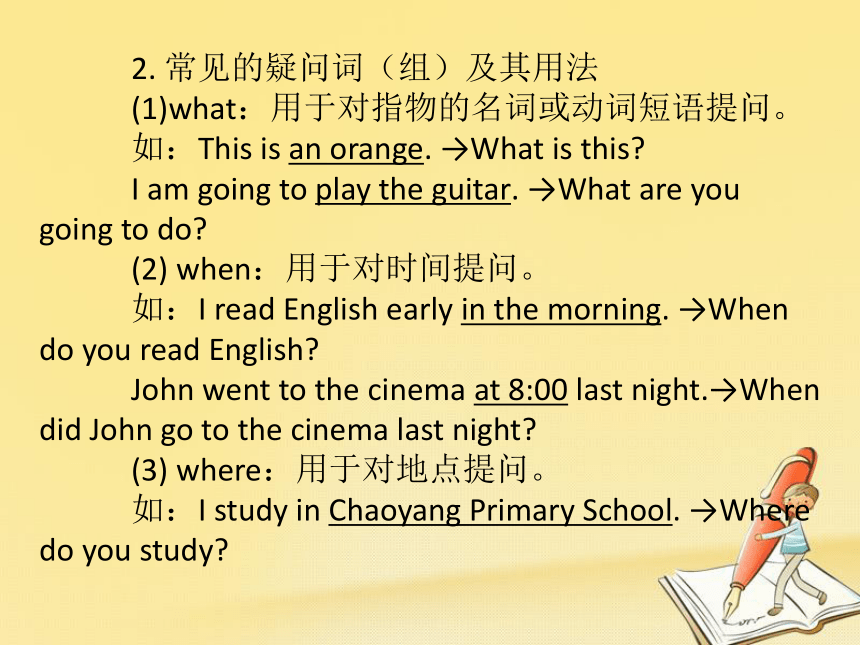


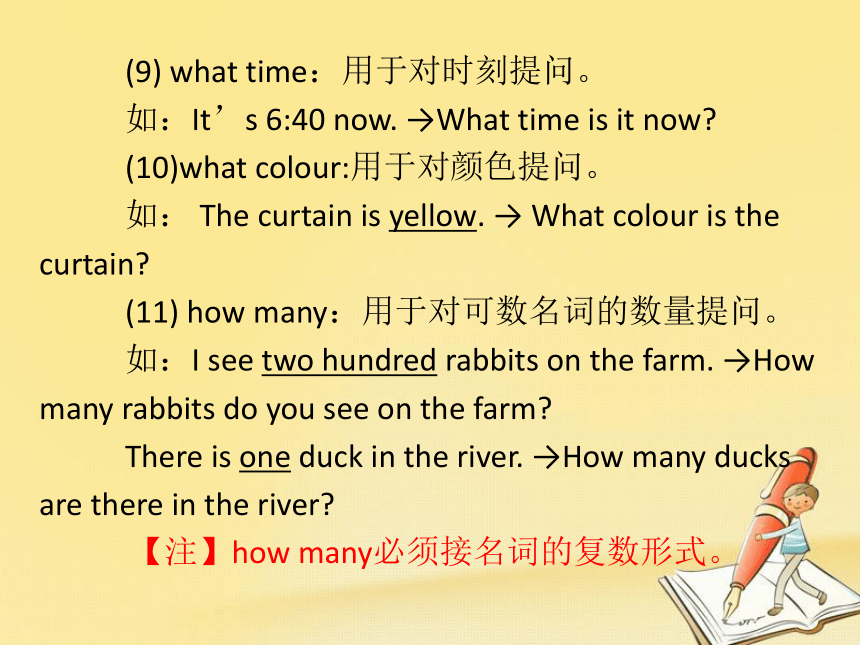
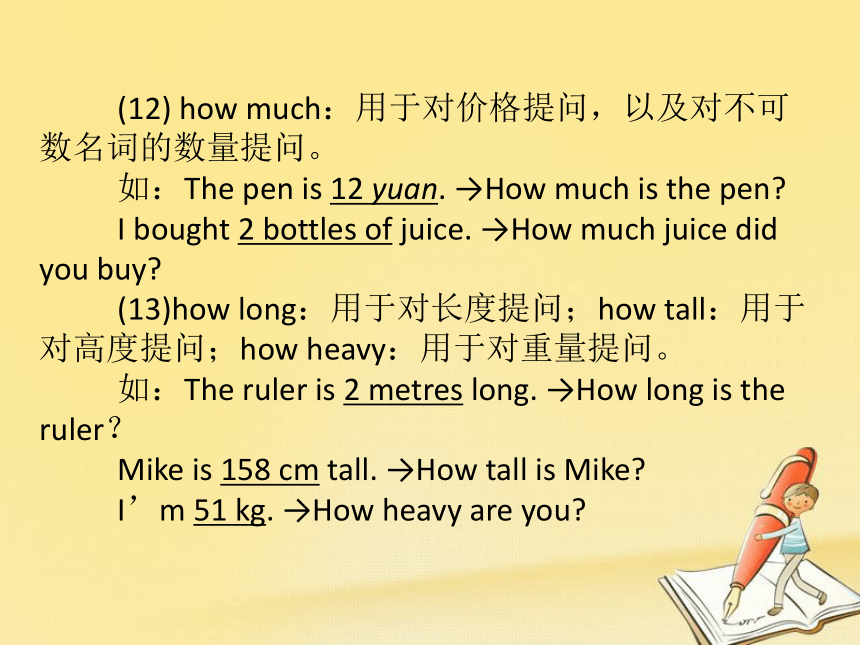
文档简介
课件35张PPT。第三章 句 型第二节 疑问句 知识梳理一、疑问句的概念、分类
疑问句的主要交际功能是提出问题,询问情况。它分为一般疑问句、特殊疑问句、选择疑问句和反义疑问句四种。在书写时句末用问号。
如:一般疑问句:Is this your classroom?
特殊疑问句:What is your name?
选择疑问句:Is your friend a boy or a girl?
反义疑问句:You like English very much, don’t you?二、一般疑问句
1. 一般疑问句的概念
一般疑问句通常用来询问一件事情是否属实,答句通常由“yes”或“no”引导,所以一般疑问句又称作“是非问句”,即“Yes/No questions”。
2. 将陈述句改为一般疑问句的方法
(1) 当句中含有be动词、情态动词时,只要把这些词提前至句首,再将句号改为问号即可。
如:He is from England.→Is he from England?
They are working hard. →Are they working hard?
Mike and John were sick last week.→Were Mike and John sick last week? 【注】①将陈述句改为疑问句的时候,一般要将第一人称改为第二人称。
如:I am doing my homework. →Are you doing your homework?
He is our new teacher. →Is he your new teacher?
②对一般疑问句的回答要简洁,在yes,no之后,要用人称代词来代替问句中的主语。
如:—Were Mike and John sick last week?
—Yes, they were. (2) 当谓语动词是行为动词时,必须在句首加上相应的助动词do,does或did,加上这些助动词后,句子中的谓语动词必须用原形。
如:I go to school by subway. →Do you go to school by subway?
Mike likes swimming. →Does Mike like swimming?
My mother read a magazine yesterday afternoon.
→Did your mother read a magazine yesterday afternoon? (3)在把陈述句变成一般疑问句的时候,若句中有some,something,somebody等词,要将之变成any,anything,anybody等。
如:There is some water in the glass.→Is there any water in the glass?
Somebody is waiting for you near the gate. →Is anybody waiting for me near the gate?
【注】当some 是某些固定搭配词组的组成部分时,则无须变化。这样的词组包括do some shopping,do some cleaning, do some washing, do some reading等。
如:I do some shopping with my aunt on Saturday.
→Do you do some shopping with your aunt on Saturday?三、特殊疑问句
1. 特殊疑问句的概念
以特殊疑问词开头的疑问句,叫作特殊疑问句。常见的特殊疑问词包括:what(什么),when(什么时候),where(哪里),why(为什么),how(怎么样),which(哪一个),who(谁),whose(谁的), 另外还有一些特殊疑问词组,如:what time(什么时间),what colour(什么颜色),what size(什么尺码),how many/much(多少),how long (多长),how often(多久)等。 2. 常见的疑问词(组)及其用法
(1)what:用于对指物的名词或动词短语提问。
如:This is an orange. →What is this?
I am going to play the guitar. →What are you going to do?
(2) when:用于对时间提问。
如:I read English early in the morning. →When do you read English?
John went to the cinema at 8:00 last night.→When did John go to the cinema last night?
(3) where:用于对地点提问。
如:I study in Chaoyang Primary School. →Where do you study? (4)why:用于对事情的原因提问。
如:I go to work by subway because it is fast. →Why do you go to work by subway?
(5)how:用于对方式或程度等提问。
如:I go to school on foot. →How do you go to school?
(6)which:用于对名词前的修饰词提问,而且必须和名词连用。
如:I want the big backpack. →Which backpack do you want?
The woman with a handbag is Miss Green. →Which woman is Miss Green?
The taller man is Mr Black. →Which man is Mr Black? (7)who:用于对人提问,作宾语时可用whom代替。
如:My sister is drawing a horse. →Who is drawing a horse?
I often play with Lucy after school. →Who/Whom do you often play with after school?
【注】用who 对主语提问时,后面的谓语动词或助动词一般要用第三人称单数形式。
(8) whose:用于对物主代词和名词所有格提问,通常和名词连用。
如:Mike’s coat is on the chair. →Whose coat is on the chair? (9) what time:用于对时刻提问。
如:It’s 6:40 now. →What time is it now?
(10)what colour:用于对颜色提问。
如: The curtain is yellow. → What colour is the curtain?
(11) how many:用于对可数名词的数量提问。
如:I see two hundred rabbits on the farm. →How many rabbits do you see on the farm?
There is one duck in the river. →How many ducks are there in the river?
【注】how many必须接名词的复数形式。 (12) how much:用于对价格提问,以及对不可数名词的数量提问。
如:The pen is 12 yuan. →How much is the pen?
I bought 2 bottles of juice. →How much juice did you buy?
(13)how long:用于对长度提问;how tall:用于对高度提问;how heavy:用于对重量提问。
如:The ruler is 2 metres long. →How long is the ruler?
Mike is 158 cm tall. →How tall is Mike?
I’m 51 kg. →How heavy are you? (14)how often:用于对时间频率提问。
如:I water the flowers once a day. →How often do you water the flowers?
(15)how far:用于对距离提问。
如:It’s about two kilometres from here to the country.→How far is it from here to the country?
(16)对日期、星期几、天气等提问,则分别用:
问日期:What’s the date today?
问星期几:What day is it today?
问天气:What’s the weather like today?四、选择疑问句
选择疑问句提出两个或两个以上可能的答案供对方选择。这类疑问句由两部分组成:疑问句+选项A or 选项B?
如:Is your pen pal a boy or a girl?
Do you like playing football,basketball or baseball?
Which flower do you like, the pink one or the purple one?
【注】一般的选择疑问句不能用“yes”或“no”回答,而要选择回答。如:
—Is your pen pal a boy or a girl?
—A girl. 但是,也有例外。如:—Shall we walk or go by bus?
—No, we shall go by taxi. 五、反义疑问句
1. 反义疑问句的概念
反义疑问句是对陈述句所叙述的事实提出看法,问对方是否同意。
2. 反义疑问句的结构反义疑问句由两部分组成:陈述句+简略问句。
(1) 如果前一部分为肯定形式,则后一部分用否定形式。
(2)如果前一部分为否定形式,则后一部分用肯定形式。 3. 反义疑问句的用法
(1) 一般来说,简略问句中的主语人称、数和动词的时态要与陈述句中的主语人称、数和动词的时态相一致,并且在简略问句部分一定要用人称代词来代替前面所说的人或事物。
如:Mary likes reading, doesn’t she?
You aren’t a new student, are you?
(2)如果陈述句中有be动词或情态动词,则其简短问句要用同一个词。
如:He can swim, can’t he?
Your mother is a teacher, isn’t she?
(3) 陈述部分是there be句型时,简略问句部分也用there be。
如:There are some people in the room, aren’t there?考点精析考点1 考查特殊疑问词(组)的运用
【例1】从How many,How much,How often,How far,How old中选择适当的疑问词组填空
1. — is the doll?—It’s 20 dollars.
2. — is it from Guangzhou to Shenzhen?
—About 2 hours by car.
3. — birds can you see in the tree?—13.
4. — do you do sports?—Three times a week.
5. — is the plant?—It’s one month old. 解析:本题考查how 引导的特殊疑问词组所构成的特殊疑问句。这要求学生熟记各疑问词组的意思和用法, 同时根据答句分析选择是关键。第1小题答句中的20 dollars 涉及价钱; 第2小题答句About two hours by car 与路程相关;第3小题一个简单的13回答的是数量;第4小题Three times a week 说的是频率;第5小题 one month old 与年龄相关。
答案:1. How much 2. How far 3. How many 4. How often 5. How old举一反三
1. 用适当的特殊疑问词组填空。
(1) —_____________ is your backpack?
—Blue.
(2) —_________ do you get up at the weekend?
—At 8:00.
(3) —__________ do you wear?
—I wear Size L.
(4) —___________ is it today?
—It's Friday. What colourWhat timeWhat sizeWhat day 2. 用适当的疑问词填空。
(1) —_________bike is that?
—Mike's.
(2) —_________ is my mobile phone?
—Is it on the sofa?
(3) —_________ is your father?
—He's fine.
(4) —_________ umbrella is yours?
—The blue one.
(5) —_________ do you like summer?
—Because I can go swimming then. WhyWhoseWhereHowWhich考点2 考查陈述句与疑问句的句型转换
【例2】 按要求完成下列句子。
1. Mike takes a bus to school. (改为一般疑问句,并做肯定回答)
2. She is a nurse.(改为一般疑问句,并做否定回答)
3. My schoolbag is red(就画线部分提问) 解析:第1小题考查的是含行为动词的陈述句变为一般疑问句的方法。要特别注意行为动词的三单形式变问句时需要在句首加助动词does,而后面用原形动词; 回答的时候,在yes或者no之后要用人称代词来代替原句中的人或事物。第2题考查的是一般疑问句的改写方法。简单地讲,如果陈述句中有be动词、have、助动词或情态动词,直接将其提到句首,句末句点变为问号即可;如果没有,则需要在句首加上助动词(如do / does / did等)才能将陈述句转变成一般疑问句。如果陈述句主语是第一人称,提问时要将其变为第二人称,谓语动词也要做出相应的变化。因此,在第2小题中的陈述句可以改成这样的一般疑问句:Is she a nurse?否定回答是:No,she isn’t.第3题考查特殊疑问句的用法,题中的画线部分表示颜色,对颜色提问应该用what colour,再套用“疑问词+一般疑问句”这一特殊疑问句的结构形式,本题的答案应该是:what colour is your schoolbag?
答案:1.—Does Mike take a bus to school?—Yes, he does.
2.—Is she a nurse?—No, she isn’t.
3.What colour is your schoolbag?【例3】将下列反义疑问句补充完整, 并作肯定回答。
—My grandpa likes reading, ______________?
—______________________________________
解析:反义疑问句的简略问句部分的人称和谓语动词必须和主句的保持一致, likes 对应的助动词是does, 且要用人称代词he代替my grandpa.
答案:doesn’t he;
Yes, he does.
【例4】就画线部分提问。
1. The blue skirt is Amy’s.
________________________________________
2. The blue skirt is Amy’s.
________________________________________
解析:本题考查就画线部分提问,画线部分就是将陈述句改成特殊疑问句的提问点,也就是决定选择哪个特殊疑问词。第1小题中的blue其实是要加入the blue用于指定名词的性质,也就是找“哪一个(which)”的问题; 第2小题中的Amy’s 是说明物主,即要找是“谁的(whose)”东西的问题。
答案:1. Which skirt is Amy’s?
2. Whose is the blue skirt? 举一反三
1. 将下列句子改为一般疑问句。
(1) Jack is a Canadian boy.
_______________________________________
(2) Mary comes from America.
_______________________________________
(3) They do morning exercises every day.
_______________________________________Do they do morning exercises every day? Is Jack a Canadian boy?Does Mary come from America? 2. 将下列句子改为反义疑问句。
(1) Jane and Amy are in the same class.
_______________________________________
_______________________________________
(2) We won't go with our parents.
_______________________________________
(3) My uncle plays football every Monday afternoon.
_______________________________________
_______________________________________My uncle plays football every Monday afternoon, doesn't he? Jane and Amy are in the same class,aren’t they?We won’t go with our parents, will we? 3. 就画线部分提问。
(1) I can run with you.
_______________________________________
(2) The pair of shoes is 98 yuan.
_______________________________________
(3) Jason wants the brown coat.
_______________________________________Which coat does Jason want?What can you do?How much is the pair of shoes?过关检测1. 单项填空。
( )1. —_____ is your shirt?
—It’s black and white.
A. What B. What colour C. Which
( )2. —_____ room is it?
—It’s the twins’.
A. What B. Which C. Whose
( )3. —_____ room is the twins’?
—The pink one.
A. What B. Which C. Whose
( )4. _____you like some milk?
A. Are B. Can C. Would BCBC( )5. — _____cups of tea do you want?
—Two.
A. How many B. How much C. How far
( )6. — _____tea do you want?
—Two cups.
A. How many B. How much C. How far
( )7. Will she _____ tomorrow?
A. come B.comes C. coming
( )8. _____ you _____ swimming this Saturday?
A. Will; go to B. Will; go C. Will; going
( )9. —_____?
—It’s five.
A. What day is it B. What time is it
C. How much is it
( )10. How many _____ can you see?
A. bird B. birds C. birdesABABBB二、用适当的疑问词(组)填空。
1. —_______ book is on the chair?—Mike’s.
2. —_______ book is Mike’s?—The one on the chair.
3. —_______ is Mike’s book?—On the chair.
4. —_____________ is the bag?—Blue.
5. —__________ is the bag?—180 yuan.
6. —________How old is your father?—He’s 40.
7. —_______How is Mike?—He’s not well.
8. —_______Which girl is Amy?—The girl in red.
9. —_______Whose is the red T?shirt?—Amy’s.
10. —_____________ do you water the flowers?
—Twice a week.
WhoseWhichWhereWhat colour How muchHow oldHowWhichWhoseHow often三、将下列陈述句改为一般疑问句。
1. I’m putting on my clothes.
_____ _____ putting on _____ clothes?
2. She leaves home very early.
_____ she _____ home very early?
3. My sister often does her homework at home.
_____ your sister often _____ her homework at home?
4. He is two years older than his sister.
_____ _____ two years older than his sister?
5. Tom has lunch at school every day.
_____ Tom _____ lunch at school every day?
6. I did my homework at school yesterday.
_____ you _____ _____ homework at school yesterday? AreyouyourDoesleaveDoesdoIsheDoeshaveDiddoyour四、把下列句子改为反义疑问句。
1. There’re more than ten pandas on the hill.
There’re more than ten pandas on the hill, _______ _______?
2. You like listening to soft music.
You like listening to soft music, _______ _____?
3. She isn’t the best one in the class.
She isn’t the best one in the class, _____ _____?
4. Everything goes well.
Everything goes well, _________ _____?
5. Mike came here by bike.
Mike came here by bike, ________ _____? aren’t theredon’tyouisshedoesn’titdidn’the五、就画线部分提问。
1. She does exercise at home in the evening.
_____ _____ she _____ at home in the evening?
2. He’s going to a party on Saturday evening.
_____ _____ he going to a party?
3. The children will work on the farm.
_____ _____ _____ on the farm?
4. The woman in red coat is her mother.
_______ _______is her mother?
5. She writes to her parents once a week.
_____ _____ _____ she write to her parents? WhatdoesdoWhenisWhowillworkWhichwomanHowoftendoes6. She is going to read a book this Sunday.
_____ _____ she _______ _____ _____ this Sunday?
7. My sister is doing her homework.
_____ _____ your sister _______?
8. Bill goes to Sydney by plane.
_____ _____Bill _____ to Sydney?
9. I’m going to the zoo because I want to see the baby panda.
_____ _____ _____ _____ _____ the zoo?
10. The sun shines, and the water becomes vapour.
_____ _____ the water become vapour?WhatisgoingtodoWhatisdoingHowdoesgoWhyareyougoingtoHowdoes
疑问句的主要交际功能是提出问题,询问情况。它分为一般疑问句、特殊疑问句、选择疑问句和反义疑问句四种。在书写时句末用问号。
如:一般疑问句:Is this your classroom?
特殊疑问句:What is your name?
选择疑问句:Is your friend a boy or a girl?
反义疑问句:You like English very much, don’t you?二、一般疑问句
1. 一般疑问句的概念
一般疑问句通常用来询问一件事情是否属实,答句通常由“yes”或“no”引导,所以一般疑问句又称作“是非问句”,即“Yes/No questions”。
2. 将陈述句改为一般疑问句的方法
(1) 当句中含有be动词、情态动词时,只要把这些词提前至句首,再将句号改为问号即可。
如:He is from England.→Is he from England?
They are working hard. →Are they working hard?
Mike and John were sick last week.→Were Mike and John sick last week? 【注】①将陈述句改为疑问句的时候,一般要将第一人称改为第二人称。
如:I am doing my homework. →Are you doing your homework?
He is our new teacher. →Is he your new teacher?
②对一般疑问句的回答要简洁,在yes,no之后,要用人称代词来代替问句中的主语。
如:—Were Mike and John sick last week?
—Yes, they were. (2) 当谓语动词是行为动词时,必须在句首加上相应的助动词do,does或did,加上这些助动词后,句子中的谓语动词必须用原形。
如:I go to school by subway. →Do you go to school by subway?
Mike likes swimming. →Does Mike like swimming?
My mother read a magazine yesterday afternoon.
→Did your mother read a magazine yesterday afternoon? (3)在把陈述句变成一般疑问句的时候,若句中有some,something,somebody等词,要将之变成any,anything,anybody等。
如:There is some water in the glass.→Is there any water in the glass?
Somebody is waiting for you near the gate. →Is anybody waiting for me near the gate?
【注】当some 是某些固定搭配词组的组成部分时,则无须变化。这样的词组包括do some shopping,do some cleaning, do some washing, do some reading等。
如:I do some shopping with my aunt on Saturday.
→Do you do some shopping with your aunt on Saturday?三、特殊疑问句
1. 特殊疑问句的概念
以特殊疑问词开头的疑问句,叫作特殊疑问句。常见的特殊疑问词包括:what(什么),when(什么时候),where(哪里),why(为什么),how(怎么样),which(哪一个),who(谁),whose(谁的), 另外还有一些特殊疑问词组,如:what time(什么时间),what colour(什么颜色),what size(什么尺码),how many/much(多少),how long (多长),how often(多久)等。 2. 常见的疑问词(组)及其用法
(1)what:用于对指物的名词或动词短语提问。
如:This is an orange. →What is this?
I am going to play the guitar. →What are you going to do?
(2) when:用于对时间提问。
如:I read English early in the morning. →When do you read English?
John went to the cinema at 8:00 last night.→When did John go to the cinema last night?
(3) where:用于对地点提问。
如:I study in Chaoyang Primary School. →Where do you study? (4)why:用于对事情的原因提问。
如:I go to work by subway because it is fast. →Why do you go to work by subway?
(5)how:用于对方式或程度等提问。
如:I go to school on foot. →How do you go to school?
(6)which:用于对名词前的修饰词提问,而且必须和名词连用。
如:I want the big backpack. →Which backpack do you want?
The woman with a handbag is Miss Green. →Which woman is Miss Green?
The taller man is Mr Black. →Which man is Mr Black? (7)who:用于对人提问,作宾语时可用whom代替。
如:My sister is drawing a horse. →Who is drawing a horse?
I often play with Lucy after school. →Who/Whom do you often play with after school?
【注】用who 对主语提问时,后面的谓语动词或助动词一般要用第三人称单数形式。
(8) whose:用于对物主代词和名词所有格提问,通常和名词连用。
如:Mike’s coat is on the chair. →Whose coat is on the chair? (9) what time:用于对时刻提问。
如:It’s 6:40 now. →What time is it now?
(10)what colour:用于对颜色提问。
如: The curtain is yellow. → What colour is the curtain?
(11) how many:用于对可数名词的数量提问。
如:I see two hundred rabbits on the farm. →How many rabbits do you see on the farm?
There is one duck in the river. →How many ducks are there in the river?
【注】how many必须接名词的复数形式。 (12) how much:用于对价格提问,以及对不可数名词的数量提问。
如:The pen is 12 yuan. →How much is the pen?
I bought 2 bottles of juice. →How much juice did you buy?
(13)how long:用于对长度提问;how tall:用于对高度提问;how heavy:用于对重量提问。
如:The ruler is 2 metres long. →How long is the ruler?
Mike is 158 cm tall. →How tall is Mike?
I’m 51 kg. →How heavy are you? (14)how often:用于对时间频率提问。
如:I water the flowers once a day. →How often do you water the flowers?
(15)how far:用于对距离提问。
如:It’s about two kilometres from here to the country.→How far is it from here to the country?
(16)对日期、星期几、天气等提问,则分别用:
问日期:What’s the date today?
问星期几:What day is it today?
问天气:What’s the weather like today?四、选择疑问句
选择疑问句提出两个或两个以上可能的答案供对方选择。这类疑问句由两部分组成:疑问句+选项A or 选项B?
如:Is your pen pal a boy or a girl?
Do you like playing football,basketball or baseball?
Which flower do you like, the pink one or the purple one?
【注】一般的选择疑问句不能用“yes”或“no”回答,而要选择回答。如:
—Is your pen pal a boy or a girl?
—A girl. 但是,也有例外。如:—Shall we walk or go by bus?
—No, we shall go by taxi. 五、反义疑问句
1. 反义疑问句的概念
反义疑问句是对陈述句所叙述的事实提出看法,问对方是否同意。
2. 反义疑问句的结构反义疑问句由两部分组成:陈述句+简略问句。
(1) 如果前一部分为肯定形式,则后一部分用否定形式。
(2)如果前一部分为否定形式,则后一部分用肯定形式。 3. 反义疑问句的用法
(1) 一般来说,简略问句中的主语人称、数和动词的时态要与陈述句中的主语人称、数和动词的时态相一致,并且在简略问句部分一定要用人称代词来代替前面所说的人或事物。
如:Mary likes reading, doesn’t she?
You aren’t a new student, are you?
(2)如果陈述句中有be动词或情态动词,则其简短问句要用同一个词。
如:He can swim, can’t he?
Your mother is a teacher, isn’t she?
(3) 陈述部分是there be句型时,简略问句部分也用there be。
如:There are some people in the room, aren’t there?考点精析考点1 考查特殊疑问词(组)的运用
【例1】从How many,How much,How often,How far,How old中选择适当的疑问词组填空
1. — is the doll?—It’s 20 dollars.
2. — is it from Guangzhou to Shenzhen?
—About 2 hours by car.
3. — birds can you see in the tree?—13.
4. — do you do sports?—Three times a week.
5. — is the plant?—It’s one month old. 解析:本题考查how 引导的特殊疑问词组所构成的特殊疑问句。这要求学生熟记各疑问词组的意思和用法, 同时根据答句分析选择是关键。第1小题答句中的20 dollars 涉及价钱; 第2小题答句About two hours by car 与路程相关;第3小题一个简单的13回答的是数量;第4小题Three times a week 说的是频率;第5小题 one month old 与年龄相关。
答案:1. How much 2. How far 3. How many 4. How often 5. How old举一反三
1. 用适当的特殊疑问词组填空。
(1) —_____________ is your backpack?
—Blue.
(2) —_________ do you get up at the weekend?
—At 8:00.
(3) —__________ do you wear?
—I wear Size L.
(4) —___________ is it today?
—It's Friday. What colourWhat timeWhat sizeWhat day 2. 用适当的疑问词填空。
(1) —_________bike is that?
—Mike's.
(2) —_________ is my mobile phone?
—Is it on the sofa?
(3) —_________ is your father?
—He's fine.
(4) —_________ umbrella is yours?
—The blue one.
(5) —_________ do you like summer?
—Because I can go swimming then. WhyWhoseWhereHowWhich考点2 考查陈述句与疑问句的句型转换
【例2】 按要求完成下列句子。
1. Mike takes a bus to school. (改为一般疑问句,并做肯定回答)
2. She is a nurse.(改为一般疑问句,并做否定回答)
3. My schoolbag is red(就画线部分提问) 解析:第1小题考查的是含行为动词的陈述句变为一般疑问句的方法。要特别注意行为动词的三单形式变问句时需要在句首加助动词does,而后面用原形动词; 回答的时候,在yes或者no之后要用人称代词来代替原句中的人或事物。第2题考查的是一般疑问句的改写方法。简单地讲,如果陈述句中有be动词、have、助动词或情态动词,直接将其提到句首,句末句点变为问号即可;如果没有,则需要在句首加上助动词(如do / does / did等)才能将陈述句转变成一般疑问句。如果陈述句主语是第一人称,提问时要将其变为第二人称,谓语动词也要做出相应的变化。因此,在第2小题中的陈述句可以改成这样的一般疑问句:Is she a nurse?否定回答是:No,she isn’t.第3题考查特殊疑问句的用法,题中的画线部分表示颜色,对颜色提问应该用what colour,再套用“疑问词+一般疑问句”这一特殊疑问句的结构形式,本题的答案应该是:what colour is your schoolbag?
答案:1.—Does Mike take a bus to school?—Yes, he does.
2.—Is she a nurse?—No, she isn’t.
3.What colour is your schoolbag?【例3】将下列反义疑问句补充完整, 并作肯定回答。
—My grandpa likes reading, ______________?
—______________________________________
解析:反义疑问句的简略问句部分的人称和谓语动词必须和主句的保持一致, likes 对应的助动词是does, 且要用人称代词he代替my grandpa.
答案:doesn’t he;
Yes, he does.
【例4】就画线部分提问。
1. The blue skirt is Amy’s.
________________________________________
2. The blue skirt is Amy’s.
________________________________________
解析:本题考查就画线部分提问,画线部分就是将陈述句改成特殊疑问句的提问点,也就是决定选择哪个特殊疑问词。第1小题中的blue其实是要加入the blue用于指定名词的性质,也就是找“哪一个(which)”的问题; 第2小题中的Amy’s 是说明物主,即要找是“谁的(whose)”东西的问题。
答案:1. Which skirt is Amy’s?
2. Whose is the blue skirt? 举一反三
1. 将下列句子改为一般疑问句。
(1) Jack is a Canadian boy.
_______________________________________
(2) Mary comes from America.
_______________________________________
(3) They do morning exercises every day.
_______________________________________Do they do morning exercises every day? Is Jack a Canadian boy?Does Mary come from America? 2. 将下列句子改为反义疑问句。
(1) Jane and Amy are in the same class.
_______________________________________
_______________________________________
(2) We won't go with our parents.
_______________________________________
(3) My uncle plays football every Monday afternoon.
_______________________________________
_______________________________________My uncle plays football every Monday afternoon, doesn't he? Jane and Amy are in the same class,aren’t they?We won’t go with our parents, will we? 3. 就画线部分提问。
(1) I can run with you.
_______________________________________
(2) The pair of shoes is 98 yuan.
_______________________________________
(3) Jason wants the brown coat.
_______________________________________Which coat does Jason want?What can you do?How much is the pair of shoes?过关检测1. 单项填空。
( )1. —_____ is your shirt?
—It’s black and white.
A. What B. What colour C. Which
( )2. —_____ room is it?
—It’s the twins’.
A. What B. Which C. Whose
( )3. —_____ room is the twins’?
—The pink one.
A. What B. Which C. Whose
( )4. _____you like some milk?
A. Are B. Can C. Would BCBC( )5. — _____cups of tea do you want?
—Two.
A. How many B. How much C. How far
( )6. — _____tea do you want?
—Two cups.
A. How many B. How much C. How far
( )7. Will she _____ tomorrow?
A. come B.comes C. coming
( )8. _____ you _____ swimming this Saturday?
A. Will; go to B. Will; go C. Will; going
( )9. —_____?
—It’s five.
A. What day is it B. What time is it
C. How much is it
( )10. How many _____ can you see?
A. bird B. birds C. birdesABABBB二、用适当的疑问词(组)填空。
1. —_______ book is on the chair?—Mike’s.
2. —_______ book is Mike’s?—The one on the chair.
3. —_______ is Mike’s book?—On the chair.
4. —_____________ is the bag?—Blue.
5. —__________ is the bag?—180 yuan.
6. —________How old is your father?—He’s 40.
7. —_______How is Mike?—He’s not well.
8. —_______Which girl is Amy?—The girl in red.
9. —_______Whose is the red T?shirt?—Amy’s.
10. —_____________ do you water the flowers?
—Twice a week.
WhoseWhichWhereWhat colour How muchHow oldHowWhichWhoseHow often三、将下列陈述句改为一般疑问句。
1. I’m putting on my clothes.
_____ _____ putting on _____ clothes?
2. She leaves home very early.
_____ she _____ home very early?
3. My sister often does her homework at home.
_____ your sister often _____ her homework at home?
4. He is two years older than his sister.
_____ _____ two years older than his sister?
5. Tom has lunch at school every day.
_____ Tom _____ lunch at school every day?
6. I did my homework at school yesterday.
_____ you _____ _____ homework at school yesterday? AreyouyourDoesleaveDoesdoIsheDoeshaveDiddoyour四、把下列句子改为反义疑问句。
1. There’re more than ten pandas on the hill.
There’re more than ten pandas on the hill, _______ _______?
2. You like listening to soft music.
You like listening to soft music, _______ _____?
3. She isn’t the best one in the class.
She isn’t the best one in the class, _____ _____?
4. Everything goes well.
Everything goes well, _________ _____?
5. Mike came here by bike.
Mike came here by bike, ________ _____? aren’t theredon’tyouisshedoesn’titdidn’the五、就画线部分提问。
1. She does exercise at home in the evening.
_____ _____ she _____ at home in the evening?
2. He’s going to a party on Saturday evening.
_____ _____ he going to a party?
3. The children will work on the farm.
_____ _____ _____ on the farm?
4. The woman in red coat is her mother.
_______ _______is her mother?
5. She writes to her parents once a week.
_____ _____ _____ she write to her parents? WhatdoesdoWhenisWhowillworkWhichwomanHowoftendoes6. She is going to read a book this Sunday.
_____ _____ she _______ _____ _____ this Sunday?
7. My sister is doing her homework.
_____ _____ your sister _______?
8. Bill goes to Sydney by plane.
_____ _____Bill _____ to Sydney?
9. I’m going to the zoo because I want to see the baby panda.
_____ _____ _____ _____ _____ the zoo?
10. The sun shines, and the water becomes vapour.
_____ _____ the water become vapour?WhatisgoingtodoWhatisdoingHowdoesgoWhyareyougoingtoHowdoes
